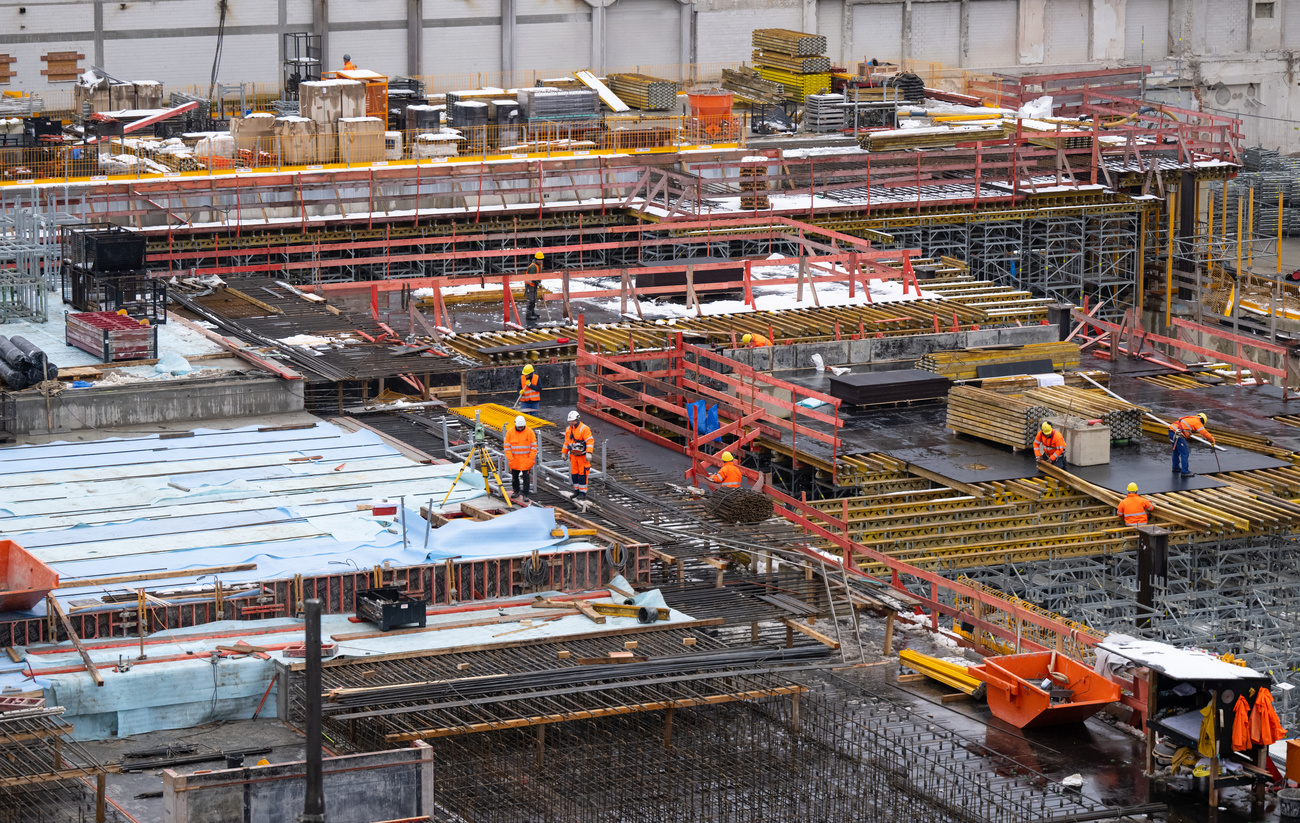
Demographic shifts cause Swiss labour market crunch

Switzerland, like most developed economies, is suffering from a historic labour shortage in certain key sectors. The country’s ageing population and changing lifestyles are profoundly transforming the labour market – and this is only the beginning.
In late 2022, Switzerland registered more than 120,000 job openings. This figure is the highest recorded by the Federal Statistical Office since it began collecting this dataExternal link in 2003. The vacancies spanned sectors as varied as manufacturing, health, commerce, hotels and restaurants, construction, and information technology. Certain key expertise, documented in Adecco’s annual skills-shortage indexExternal link, is proving particularly difficult to secure.
The need for personnel is amplified by the lowest unemployment rate in 20 years: 2.2%, according to the State Secretariat for Economic Affairs (SECO). This rate is considered full employment.
Switzerland is not alone in this struggle. The magnitude of the global labour shortage is unprecedented, with three out of four companies – across all sectors – reporting recruitment difficulties in ManpowerGroup’s 2022 surveyExternal link of worker scarcity.
According to ManpowerGroup, Switzerland’s shortage falls around the global average, with 74% of companies struggling to hire the necessary personnel. The situation is particularly tense in Taiwan, Portugal, Singapore, China, and India.
Although there are big differences among European Union (EU) countries, the average unemployment rates in the OECD and the eurozone are also at historic lowsExternal link. In short, it’s been a long time since the world economy has confronted such a worker shortage.
Filling the void left by baby boomers
The strong economic recovery following the height of the Covid-19 pandemic has intensified companies’ need for personnel. But the current labour shortage also has roots in several more structural factors.
Ageing populations are the main challenge in developed countries, according to Philippe WannerExternal link, a professor at the University of Geneva’s demography and socio-economics institute. The fertility rate in industrialised countries has long been well below the threshold of generational replacement (2.1 children per woman), including in China, where the population decreased in 2022External link for the first time in 60 years.
The baby boomers – born during the population explosion between 1945 and the early 1960s – have already started retiring. They should reach their retirement peak between now and 2030, leaving a vacuum that is difficult to fill. The problem is particularly severe in certain professions, like general medicine. In Switzerland, the arrival of young workers onto the labour force no longer compensates for those retiring, and the gap will only widen between now and the end of the decade.
It would be foolish to hope that new births will fix the problem. “In capitalist societies, large families are often incompatible with two working parents,” said Wanner. Only generous family policies like those of the Nordic countries can encourage a higher birth rate, but not in the short term, he explained.
Wanner identified two main strategies for solving the labour crisis. The first is to better integrate certain categories of under-employed workers into the labour market. In Switzerland, this might apply especially to women – particularly those with fewer qualifications, many of whom have no current economic incentive to put their children into daycare – and to asylum seekers.
The second approach is to encourage immigration. Switzerland has committed to this path since 2002, due to the Swiss-EU agreement allowing free movement of people. In the last 20 years, the Alpine country’s population has increased by 20%, and is expected to reach nine million in 2023. This rapid growth over the last two decades is unequalled in Europe and largely a consequence of immigration: around 30% of Swiss residents were born abroad.

More
Swiss firms struggle with acute staff shortages
Is this growth sustainable? The exceptional number of job openings suggests that the influx of foreign labour stems from real economic need. But immigration has implications for infrastructure, housing, and social cohesion as well. It is therefore highly political and could become one of the major issues in the campaign for the federal elections, scheduled for autumn 2023.
To entice immigrants who have desirable skills, a country must be attractive. So far, Switzerland has unquestionably held an advantage thanks to generous salaries, favourable working conditions, and a high standard of living. But global competition for workers will surely intensify because of the labour shortage worldwide. Countries are looking for ever-more specialised skills-sets, Wanner pointed out, and “it’s not clear that [Switzerland] will be able to maintain its allure for the professional elite”.

More
Pandemic reveals Switzerland’s weak spot in securing foreign talent
Some countries have already begun “a kind of demographic marketing” to attract workers, the professor said. Many in the young Portuguese diaspora, for example, are returning home thanks to improved economic conditions in Portugal and the fiscal incentives for repatriation that Lisbon has offered since 2019.
Matching skills to needs
The challenges facing the world’s economies are not only quantitative but also qualitative. The inversion of the age pyramid is happening “during formidable transformations in the labour market,” Wanner noted. The intensifying shift towards specialisation and the service sector, he pointed out, is causing certain occupations to disappear, especially in manufacturing; it is also encouraging the rapid development of other jobs, for example in technology.
“These changes will no doubt be even more striking in the future, with advances in robotics and artificial intelligence,” Wanner said. He believes, however, that new technologies will only partially replace workers. “The human factor is and will remain important,” he insisted. “We haven’t yet invented robots capable of building roads.”
Over the past 20 years, Wanner said, Switzerland has counted on European workers to fill jobs the Swiss don’t want, jobs that typically require fewer qualifications. But, he predicted, with training levels rising across Europe, it will be increasingly necessary to recruit from outside the European Union. Immigration to Switzerland from non-EU countries, however, is strictly regulated. It is permitted only for highly qualified workers.

More
Swiss firms facing unprecedented talent crunch
“This could be problematic in the future,” Wanner said. It is not yet clear how the political world will grapple with this thorny question in the years to come, nor whether it will agree to loosening restrictions.
Wanner explained that demographic shifts will cause certain direct changes in the labour market. The increase in population and decrease in household size will, for example, necessitate additional housing and therefore boost the construction sector. The ageing population and the fact that more women are working will increase the demand for caregivers.
But precise planning for future needs is very difficult, especially for professions that do not exist yet. As Wanner explained, “You have to be able to anticipate economic needs ten years from now to start adapting education and training accordingly.”
Edited by Samuel Jaberg. Translated from French by Katherine Bidwell/gw

More
Swiss CEOs pessimistic about business but ready for challenges

In compliance with the JTI standards
More: SWI swissinfo.ch certified by the Journalism Trust Initiative































You can find an overview of ongoing debates with our journalists here . Please join us!
If you want to start a conversation about a topic raised in this article or want to report factual errors, email us at english@swissinfo.ch.